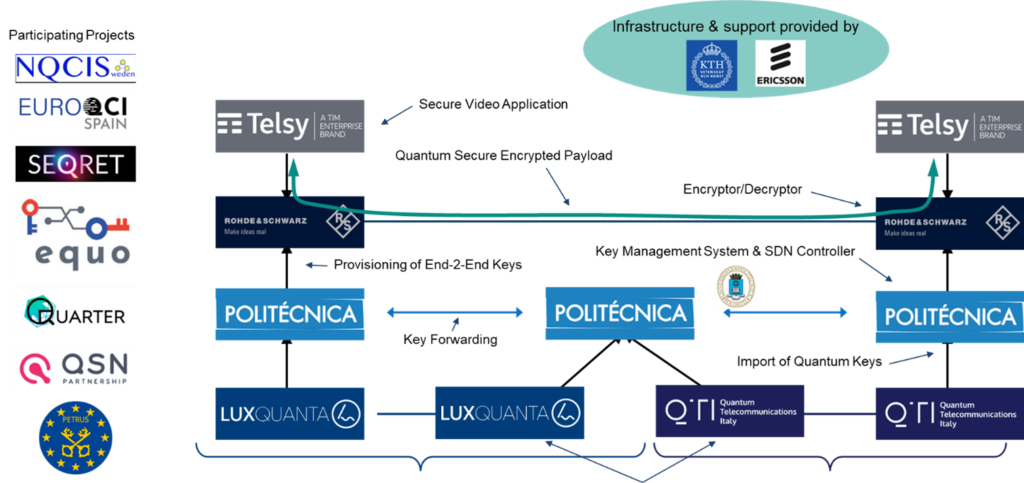On 15–16th of June, the Swedish Presidency of the Council of the EU co-hosted an event together with the European Commission on the theme of ‘A Digital, Open and Secure Europe’.
The event took place at Scandinavian XPO outside of Stockholm, Sweden.
As part of the plenary session ‘Progress in quantum technologies’, a Quantum Key Distribution System was demonstrated live. The demo was coordinated by the Coordination and Support Action for the European Quantum Communication Infrastructure (EuroQCI) , Petrus (funded by the European Commission and led by Deutsche Telekom, in conjunction with Airbus, Thales and AIT Austrian institute of Technology), together with participants of projects funded under the ‘Create a European Industrial Ecosystem for Secure QCI technologies and systems’ and ‘Deploying advanced national QCI systems and networks’ calls of the EU DIGITAL programme, and with a local team.
Quantum technology offers unprecedented capabilities. Amongst them lays ‘the quantum threat’, as it is expected that quantum computers will be able to break the encryption used to protect almost all our communications, targeting those requiring sensitive data exchange. But there is a way out, ironically also made possible by quantum mechanics. So called “Quantum Key Distribution” (QKD) generates shared secret keys between communication end points, which can then be used to protect sensitive data. QKD is ‘quantum safe’, i.e. provably secure against any algorithm – classical or quantum, known or unknown. Secret keys are immune to any computational attack of any kind of computer, present or future. Additionally, QKD offers perfect forward secrecy: if a key is broken, it does not compromise any past information, in contrast to what happens today in most cases.
To enable the usage of QKD between EU member states, a new European quantum communication infrastructure (EuroQCI) is required. At the initiative of the European Commission, EuroQCI is an integral part of IRIS², the new EU space-based secure communication system. Based on academic research by the Quantum Flagship, the European Commission now supports the development of EU-27 based supply chains for quantum devices and the deployment of national QCIs within the Digital Europe Programme.
All partners contributing to the demonstration are EU-27 companies, start-ups or academic institutions being funded by the Digital Europe Programme:
With Gemma Vall-llosera from Ericsson, on the plenary stage and Vicente Martin from UPM in a demonstration booth at the venue, the demonstration showed the use of secure video conferencing equipment provided by Telsy, using traditional symmetric encryption methods. However, the keys that were used for the encryption were quantum keys. In order to do so, two quantum links were deployed, one from the Italian company QTI and the other by the Spanish LuxQuanta. These links are managed with a control and key management system from the UPM, that delivers the keys to encryptors from the German Rohde&Schwarz to cypher the videoconferencing using standards also developed in Europe. In this sense, the QKD demonstration was a prototypical ‘Mini EuroQCI’, already including every component required for a full-blown QKD network. It showed interoperability of different QKD technologies, different vendors and different QKD protocols by an application-agnostic and vendor-independent key management & control layer to enable a quantum-safe video service via end-to-end encryption.
The demonstration was based on the following high-level design

Gemma Vall-llosera and
Vicente Martin discussed during the video conferencing the threat that quantum
computers impose on the current encryption methods and how implementing QKD
networks can mitigate this risk. They also discussed the importance that the
European Commission has given to the implementation of a European QKD network,
EuroQCI, that will be an important pillar in protecting European data
sovereignty in the future and will be gradually integrated as a service of the IRIS²
system
With the
use of equipment manufactured by EU27 companies, the demonstration showed the
progress made within the European Union in becoming autonomous in its
capability to develop, manufacture, and deliver operational QKD services and
products and that Europe is on the right track in the development of QKD
capabilities to meet the goals of EuroQCI.
See also